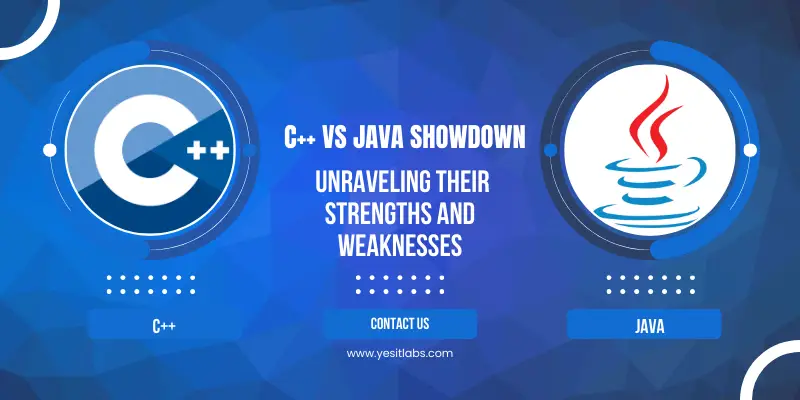
C++ vs Java Showdown: Unraveling Their Strengths and Weakness
Are you caught in the timeless debate of C++ versus Java? As a tech enthusiast or a business owner planning to hire JavaScript developers, understanding the nuances of these two stalwart programming languages can be crucial. Both C++ and Java have left indelible marks on the landscape of software development, each with its own set of strengths and weaknesses. So, let’s embark on a journey to decipher the intricacies of these languages and shed light on which might be the better fit for your project needs.
What Makes C++ Tick?
First up, let’s dive into the world of C++. C++, the elder statesman in the realm of programming languages, is renowned for its high performance, versatility, and direct hardware access. Born out of the C programming language, C++ inherited its efficiency while adding object-oriented features, making it a powerful tool for building complex systems.
Strengths of C++:
- Performance Beast: When it comes to raw performance, C++ is hard to beat. Its ability to directly manipulate hardware resources and its efficient memory management make it a preferred choice for resource-intensive applications like video games and system software.
- Versatility: C++ can be used for a wide array of applications, from embedded systems to high-performance servers. Its versatility makes it a go-to language for projects requiring low-level system interaction or high performance.
- Control: With great power comes great responsibility, and C++ provides developers with fine-grained control over memory allocation and management. This level of control allows developers to optimize performance and tailor applications to specific hardware requirements.
Weaknesses of C++:
- Complexity: C++ is often criticized for its steep learning curve and complex syntax. Novice programmers may find it challenging to grasp concepts like pointers, memory management, and multiple inheritance.
- Memory Management: While C++ offers unparalleled control over memory management, this comes at the cost of increased developer responsibility. Manual memory management can lead to memory leaks and segmentation faults if not handled properly.
Unraveling the Mysteries of Java
Now, let’s shift our focus to Java, the language that brought us the ubiquitous slogan, “Write once, run anywhere.” Java burst onto the scene in the mid-1990s, promising platform independence, ease of use, and robust security features.
Strengths of Java:
- Platform Independence: Java’s “write once, run anywhere” mantra is made possible by its bytecode compilation model. Java code is compiled into platform-independent bytecode, which can then be executed on any device with a Java Virtual Machine (JVM), making it ideal for cross-platform development.
- Simplicity and Readability: Java was designed with simplicity and readability in mind. Its syntax, inspired by C and C++, is more straightforward and less prone to error, making it an excellent choice for large-scale projects with multiple developers.
- Automatic Memory Management: Java takes the burden of memory management off the shoulders of developers with its built-in garbage collection mechanism. This automatic memory management reduces the risk of memory leaks and simplifies the development process.
Weaknesses of Java:
- Performance Overhead: While Java’s platform independence is a boon, it comes with a performance overhead compared to languages like C++. The JVM adds an additional layer of abstraction, which can impact the execution speed of Java applications, especially in resource-intensive tasks.
- Limited Low-Level Access: Java’s focus on safety and security means it restricts direct access to system resources, such as hardware and memory. While this limitation enhances security, it can be a hindrance for applications requiring low-level system interaction or high-performance computing.
Choosing the Right Tool for the Job
So, which language should you choose: C++ or Java? As with most things in the realm of software development, the answer depends on your specific project requirements.
If you’re developing a performance-critical application like a game engine or system software that demands maximum efficiency and low-level control, C++ might be the way to go. Its raw performance and fine-grained control over hardware resources make it a natural choice for such projects.
On the other hand, if you prioritize platform independence, ease of development, and automatic memory management, Java might be the better fit. Java’s simplicity, portability, and built-in security features make it well-suited for enterprise applications, web development, and mobile app development.
Conclusion
In the epic battle of C++ vs. Java, there is no clear winner. Both languages have their own strengths and weaknesses, and the choice between them ultimately boils down to your project requirements, team expertise, and performance considerations.
Whether you’re planning to hire JavaScript developers or embarking on a new software project, understanding the nuances of C++ and Java can help you make informed decisions and set your project up for success. So, weigh your options carefully, and may the code be ever in your favor!
Tags: C++, C++ vs. Java, hire JavaScript developers, hire javascript expert








